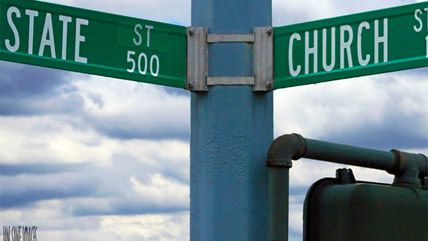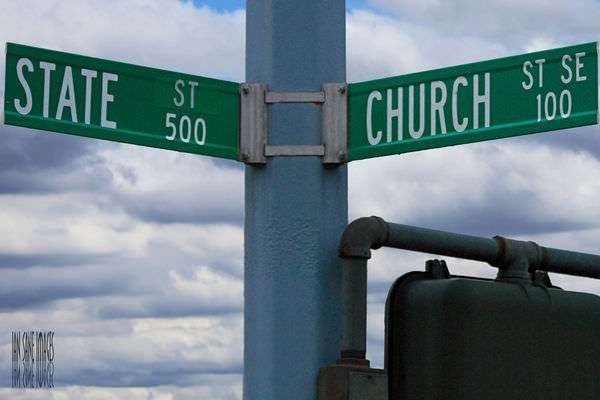Ohio Bill Sparks Debate About Religious Freedom


A piece of legislation in Ohio is causing some controversy as it aims to affect the practice of religion. The bill's proponents say it will reinforce the First Amendment's protection of religious freedom, whereas its detractors are concerned that it will blur the line between church and state.
State Representatives Tim Derickson (R-Oxford) and Bill Patmon (D-Cleveland) introduced the Ohio Religious Freedom Restoration Act (RFRA) last Wednesday. The bill would require that the state demonstrate "compelling government interest" to create any laws, policies, or regulations that place burdens on the exercise of religion.
Patmon announced at a press conference that "this legislation will help reassert the foundation upon which this country was founded and has grown and prospered on—freedom of religion and the practice of it."
However, various groups are arguing about the legality of the bill, and whether it would protect religion or push it on others. At odds on the issues are the American Civil Liberties Union's communications coordinator, Nick Worner, and the Alliance Defending Freedom's legal counsel, Joseph LaRue. The Columbus Dispatch reports:
"The Constitution is the supreme law of the land. Whatever a piece of state legislation does, it's not going to trump the U.S. Constitution," Worner said. "Individual religious freedom is extremely important, but it's never been a free pass to impose your religious beliefs on other people."
LaRue, who helped draft the Ohio bill, agrees with the ACLU that the U.S. Constitution is the law of the land, but adds, "That's only part of the story."
"The U.S. Constitution is a baseline," he said. "States can go above and beyond what the U.S. Constitution provides."
[…]
"What we've seen in states without RFRA is an increasing and creeping reduction in religious freedom," LaRue said. "They are taking away rights of individuals to live their lives in public consistent with their faith."
Another Dispatch article quotes Patrick Elliott of the Freedom From Religion Foundation. He warns that "the wording is so broad that all aspects of state enforcement, state statutes, and local ordinances would be impacted."
On the other hand, Patmon's and Derickson's bill finds precedence in the federal RFRA, which passed twenty years ago, and 17 similar state-based pieces of legislation, none of which have resulted in the cataclysm against which Elliot warns.
How exactly the bill will play out if passed is unknown. Responding to a recent incident in which the ACLU persuaded an Ohio public school to remove religious artwork, LaRue and Patmon – who are on the same side of the debate over the Ohio Religious Freedom Restoration Act – expressed contradictory opinions in the Dispatch about how the legislation would affect such situations.
With 45 cosponsors, nearly half of the state's representatives have expressed support for the bill. The vast majority of cosponsors are Republicans.
Editor's Note: As of February 29, 2024, commenting privileges on reason.com posts are limited to Reason Plus subscribers. Past commenters are grandfathered in for a temporary period. Subscribe here to preserve your ability to comment. Your Reason Plus subscription also gives you an ad-free version of reason.com, along with full access to the digital edition and archives of Reason magazine. We request that comments be civil and on-topic. We do not moderate or assume any responsibility for comments, which are owned by the readers who post them. Comments do not represent the views of reason.com or Reason Foundation. We reserve the right to delete any comment and ban commenters for any reason at any time. Comments may only be edited within 5 minutes of posting. Report abuses.
Please to post comments


Well, constitutionally speaking, the right to free exercise of religion is just as important as the prohibition against the establishment of religion. Some of the anti-establishment lawsuits have, in some ways, impinged on free exercise rights, after all. It's not total bullshit, though I don't know the motives behind this particular law.
I like this bill. These guys think that they are going to protect their state employers from the Contraception Mandate, and its going to be the "Satanists get Courthouse Monuments Too" bill.
Yes, this is a sword that cuts many ways. My new religion that says Jesus hates taxes should do well.
This is what's fucking up Christmas - people trying to inject religion into it.
Put the Saturn back in Saturnalia.
You're buying someone a used car?
You're kidding, right?! Incredible! In case you hadn't heard, Christmas is in remembrance of the birth of Jesus Christ, Whom Christians know is God. How can one inject religion into something that is that way by its very nature regardless of what secularist lawless fascist Scrooges like the ACLU & the SCOTUS et al delusionally opine.
I'm pretty sure he was kidding.
unfortunately in this world you never can tell
Dictatorship of the SoCons!
Shhhhh!! Don't reveral to the whole world how insidiously dangerous and stealthily powerful we are!
Anyone get the feeling that after reading this article they had no more idea what this law's positive/deleterious effects would be than before they read it?
Or do I just suck at reading comprehension?
Not just you.
Probably have to read the links. I don't have time for that though.
The bill is a jumbled gaggle of vague and contradictory definitions and requirements. The objective SEEMS to be the "freedom" to express and advocate religious beliefs in ANY forum, public or private.
That is, it may allow formalized prayer in public schools or government buildings, as longs as actual physical participation of others is not required. Oddly, it might protect Muslims who want to pray and preach in a Catholic church or your favorite restaurant.
So, it's bad law that's entirely based on secular interests.
You can say that again.
The bill is a jumbled gaggle of vague and contradictory definitions and requirements. The objective SEEMS to be the "freedom" to express and advocate religious beliefs in ANY forum, public or private.
That is, it may allow formalized prayer in public schools or government buildings, as longs as actual physical participation of others is not required. Oddly, it might protect Muslims who want to pray and preach in a Catholic church or your favorite restaurant.
So, it's bad law that's entirely based on secular interests.
Worner's laughable deceit pretending the Constitution is the supreme law of the land is as big a joke as lawless fascists like he and the ACLU are, for they only mean by that what they can get unelected fellow lawless fascist judges like SCOTUS's Kennedy, Ginsburg, Bryer, Sottomayor & Kagan to legislate from the bench, regardless of what the actual text really says.
What text? This text?
"The vast majority of cosponsors are Republicans."
Big surprise now that the national DNC is officially on record as being antitheist, regardless of the lies of the 2012 chair saying the convention had voted to restore "god" language that had been removed from the platform when it had not, getting only 50-50 when it needed 2/3 due to being brought up under special rules. Small surprise for Dems already long have thought they were god for decades, only pretending to fear the God of our Fathers who warned & promised such ungodly delusion was certain suicide for the nation.
That the constitution specifically provides for the free expression of belief in imaginary friends (by adults) is concession enough.
Free Exercise is actually in the Constitution.
Separate of church and state isn't.
So, yeah, I'm more worried about the First Amendment than...a thing that isn't a right at all.
Granted "separation of church and state" isn't in the Constitution, but how can free exercise be protected for all without it? So much of religion requires the practitioner to deny all other faiths, that allowing the government to favor any will oppress the others.
Can you find where, in the Constitution, free excercise is protected from anything except the government?